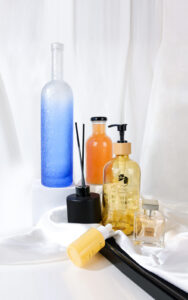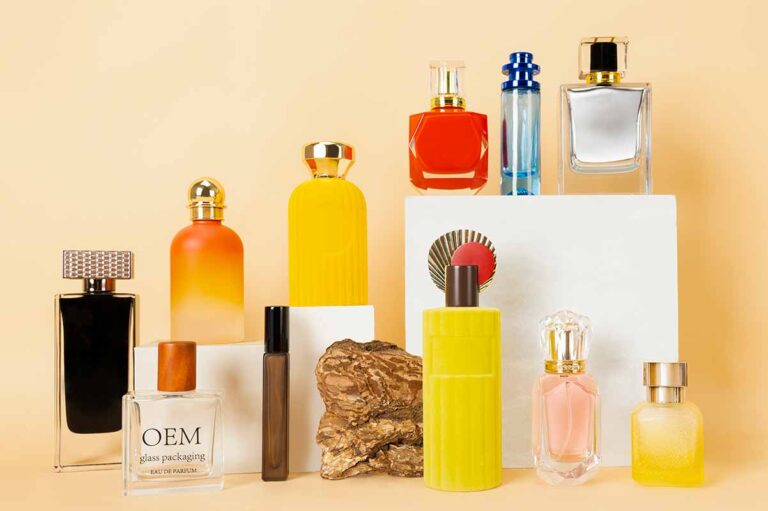Introduction
Why do some premium liquors still use corks, while others choose screw caps? If you’ve ever browsed a shelf full of whiskey, vodka, and gin, you’ve probably noticed that not all bottles are sealed the same way. Some have elegant T-top corks that “pop” when opened, while others feature clean, modern screw caps that twist off easily. Both closures serve the same purpose—protecting your spirit and keeping its flavor intact—but they represent very different traditions and marketing messages in the liquor world .
In the past five years, more craft distillers have moved to screw caps for speed and tight seals, yet iconic bottles keep the natural cork for the “luxury cue” at point of sale. Today’s distilleries care about sealing performance, sustainability, and cost efficiency just as much as style. Corks are often associated with craftsmanship and luxury, while screw caps are seen as practical, reliable, and great for mass production or exports. Each option has its place depending on your target market and brand image.
As a professional glass packaging manufacturer, HUIHE helps liquor brands pick the right spirit bottle closures for their story, budget, and liquid. So, if you’ve ever wondered which option is the best closure for your distilled spirit, keep reading; Choosing the right liquor bottle closure isn’t just about sealing your product—it’s about sealing your brand identity.
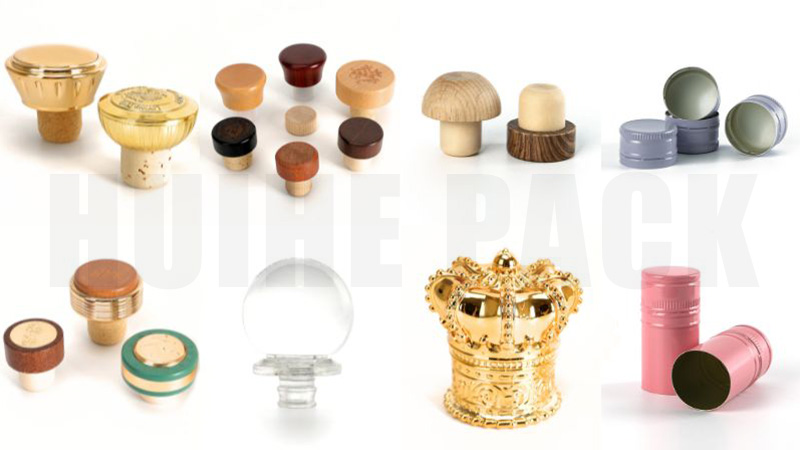
A quick look at liquor bottle closures
People have been stopping bottles for hundreds of years, and every age has used what it had on hand. Natural cork bark started the story—easy to cut, slightly elastic, and great at keeping liquid in while letting the tiniest bit of oxygen sneak through. When the wine cork vs liquor cork debate began, distillers noticed that high-proof spirits need a tighter seal than table wine, so they began to try new ideas. Today you can pick from four main liquor bottle closure types, each built from a different material and each with its own sweet spot.
Here’s a quick look at the main spirit bottle closures you’ll find in today’s market:
| Closure Type | Material | Common Usage | Pros |
| Natural Cork | Natural cork bark | Premium whiskey, brandy, cognac | Traditional look, breathable, eco-friendly |
| Synthetic Cork | Plastic or polymer blend | Vodka, flavored spirits | No cork taint, consistent seal, lower cost, easy to remove |
| Aluminum Screw Cap | Aluminum alloy | Vodka, gin, rum | Reseals tight, cost-effective, great for automation |
| Plastic Cap | Polypropylene or ABS | Economy spirits, ready-to-drink bottles | Lightweight, low-cost, versatile design |
When it comes to glass bottle packaging for spirits, every closure has its place. The key is finding the right balance between cost, appearance, and practicality—so your brand not only looks good on the shelf but also performs well in storage and shipping.
Advantages of Cork Closures
There’s something timeless about opening a bottle sealed with a cork. The gentle “pop” creates a sense of ceremony—one that instantly feels more premium and personal. That’s why many premium spirits like brandy, whiskey, and cognac still rely on cork closures today. Corks have long been a symbol of craftsmanship and authenticity, helping brands communicate heritage, quality, and care in every pour.
From a functional standpoint, corks allow a tiny bit of oxygen exchange(about 0.1 mg a day), which can subtly enhance the aroma and flavor of certain aged spirits. The micro-oxidation can round off harsh edges in high-ABV spirits after years on a shelf. This makes them especially appealing for products meant to be savored slowly. Beyond performance, cork closures are also reusable and offer a satisfying tactile experience that many consumers associate with high-end liquor.
Corks also come in many styles and combinations. You can choose natural or synthetic corks, and pair them with wood, plastic, or metal tops to achieve different looks. A wooden top feels rustic and traditional; metal brings a sleek, modern touch; and plastic is lightweight and versatile. With so many customization options, corks remain a favorite for brands that want their bottles to look and feel truly special.
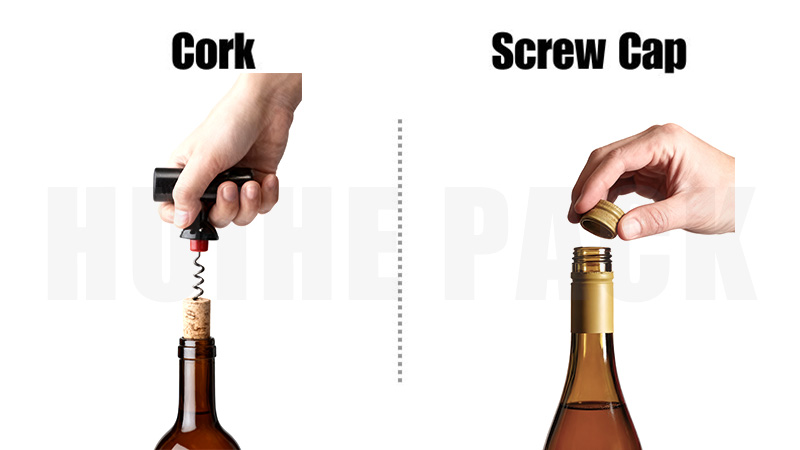
Advantages of Screw Caps
When you twist on an aluminum screw cap you get a perfect, measurable seal: oxygen transfer drops to almost zero, so leakage and “angels’ share” losses stay under 0.2 % even on long-haul container trips. From a business point of view, that reliability lets you quote export prices with confidence, and high-speed capping heads can hit 600 bpm—great news if you run an automated line. Unit cost runs 30-50 % lower than natural cork, so you free up budget for heavier glass or custom embossing.
Beyond function, screw caps also align with modern design trends. The clean, modern look also sits well on minimalist vodka, gin, or ready-to-drink cans, telling younger drinkers you value function as much as tradition.
In short, cork vs screw cap liquor bottle decisions often come down to image versus logistics; pick the side that best serves your story and your margin. → [Talk to Our Expert]
Cork vs Screw Cap: A Practical Comparison for B2B Buyers
When you’re deciding between cork vs screw cap liquor bottles, it often comes down to what matters most to your brand and production goals. Both closure types can protect your product and enhance your packaging, but they send very different messages to your buyers and consumers.
If your target market values heritage, craftsmanship, and the experience of uncorking a bottle, cork closures might be the better fit. But if you prioritize sealing strength, efficiency, and large-scale production, screw caps could be the smarter choice. For B2B buyers, the decision usually involves balancing branding, automation, cost, and sustainability.
Here’s a simple comparison that highlights the main differences between these two popular liquor bottle closures:
| Feature | Cork Closure | Screw Cap |
| Branding | Premium, traditional | Modern, minimal |
| Sealing | Slightly breathable | Airtight and secure |
| Cost | Higher | Lower |
| Automation | Manual or semi-automatic | Fully automatic |
| Sustainability | Natural cork, biodegradable, recyclable | Recyclable aluminum, low waste |
| Consumer Perception | “Craft, luxury, gift-worthy” | “Easy, fresh, everyday” |
Both types of spirit bottle closures have clear advantages. Corks enhance a brand’s storytelling and luxury feel, while screw caps excel in practicality and scalability. When choosing the best closures for a distilled spirits bottle, think about your target market, your production setup, and how you want your product to be experienced the moment it’s opened.
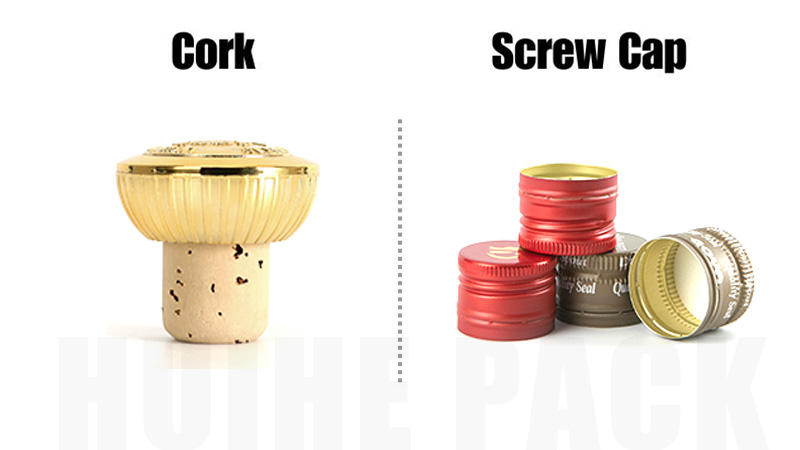
Material Cost Comparison for Liquor Closures
When it comes to choosing the right liquor bottle closures, price is often one of the most important factors—especially for large-volume producers or distributors. Each closure material comes with its own cost structure, which depends on the raw materials, design complexity, and production scale. Understanding these differences can help you make a smarter purchasing decision and control your overall packaging budget.
- Natural corks with wooden tops are usually the most expensive option. They’re often used for premium spirits like whiskey, cognac, or brandy because they look and feel luxurious. However, the material and craftsmanship behind them raise the price.
- Synthetic corks offer a good balance between quality and cost. They’re typically 30–40% cheaper than natural corks, while still providing stable sealing performance and a clean, consistent look—perfect for mid-range liquors or brands looking for efficiency without losing appeal.
- If your brand focuses on large-scale exports, aluminum screw caps might be the most cost-effective choice. They’re easy to produce, compatible with automation, and offer strong sealing performance at a low unit cost. Finally, plastic caps come in as the most affordable option. While they may not carry the same premium feel, they work well for economy products, promotional runs, or ready-to-drink beverages.
Here’s a quick overview of how each material compares:
| Closure Material | Average Unit Cost (USD) | Suitable for | Cost Efficiency |
| Natural Cork + Wood Top | $0.20–$0.40 | Premium spirits | ★★ |
| Synthetic Cork | $0.10–$0.20 | Mid-range liquors | ★★★ |
| Aluminum Screw Cap | $0.05–$0.10 | Standard, export | ★★★★ |
| Plastic Cap | $0.03–$0.06 | Economy products | ★★★★★ |
Note: Prices are approximate references and may vary depending on size, finish, and customization options.
Still, the gap is clear: switching from natural cork to an aluminum screw cap can save you roughly $0.15 per bottle. On a 50 k-bottle batch, that’s $7,500—enough to upgrade to a heavier flint glass bottle or add a custom emboss without raising the final price. Choose the closure that fits your brand story first, then let the table above keep your margin safe. → [Talk to Our Expert]
Closure–Bottle Compatibility: Choosing the Right Match
Even the best liquor bottle closures won’t perform well if they don’t fit your bottle correctly. Use the quick guide below to pair your bottle with the right liquor bottle closures on the first try.
- T-top natural corks – fit GPI 18.5 mm, 21.5 mm and 22.5 mm glass finishes. For most premium spirits like whiskey and brandy, these closures provide a firm, elegant seal that’s easy to remove and reinsert, giving customers that signature “pop” experience every time.
- Aluminum screw caps – need a standard 28 mm or 30 mm continuous thread (CT). Vodka, rum, and other clear spirits that prioritize airtight sealing and convenience use these finishes, because they let you run 600 caps per minute and pass the shake-test for export.
- Synthetic corks – work best when the glass neck has a tight tolerance (±0.25 mm). They maintain consistent compression and sealing performance, reducing the risk of leaks—especially during transport or storage.
- Custom-mold bottles – always send the neck drawing to your closure engineer first. Check inner lip depth, thread start height, and bottle finish type. A 0.5 mm gap is enough to cause tilted caps or corks that pop out under warm storage.
Pro tip: when you source glass bottle packaging for spirits from more than one factory, order some sample closures and hand-fit them before you sign the mass-order contract. A five-minute pull test today saves a container of leaks tomorrow. At HUIHE, our packaging specialists help global distilleries and liquor brands match closures and bottles seamlessly. We provide neck finish data sheets, compatibility testing, and samples to make sure every cap fits perfectly.
By ensuring a perfect match between your bottle and closure, you’ll not only improve packaging performance but also protect your brand’s image and product integrity from bottling to the customer’s hand.
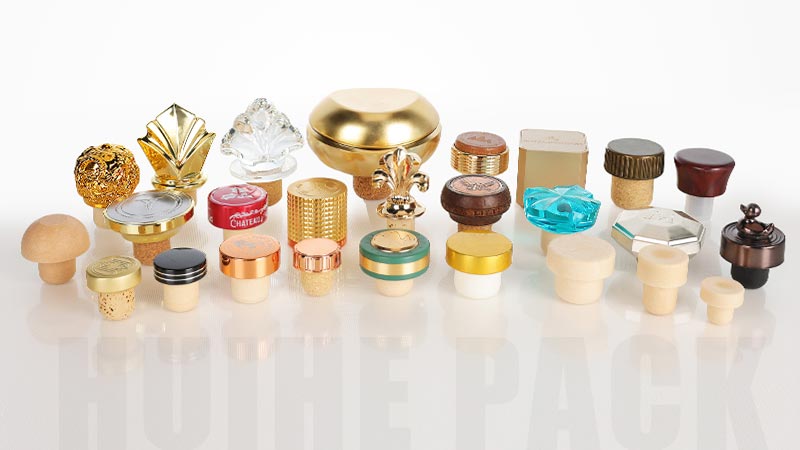
Trends in Liquor Bottle Closures (2025 Outlook)
The liquor packaging industry continues to evolve as sustainability and design differentiation become top priorities in 2025.
Sustainability is driving the adoption of synthetic corks and recyclable aluminum screw caps, which reduce waste and maintain excellent sealing performance. More distilleries are also exploring biodegradable or plant-based polymers for future eco-friendly closures.
Meanwhile, customization has become a key factor in brand storytelling. Distillers increasingly request logo embossing, engraved wooden tops, and color-anodized aluminum collars to enhance shelf visibility and premium perception.
From a global market perspective, the shift toward new types of spirit bottle closures is happening everywhere.
- In Europe, stricter packaging rules under the new EU Packaging and Packaging Waste Regulation are pushing brands to consider more recyclable materials. Some producers are experimenting with cork-aluminum hybrids to retain a premium look while improving their carbon footprint.
- In North America, many craft distillers continue to emphasize artisanal value—so demand remains strong for T-top natural corks among boutique whiskey and small-batch spirit brands. At the same time, sustainability and consistency pressures are driving interest in synthetic corks and hybrid solutions.
- In Asia-Pacific, there is strong momentum behind screw-cap adoption, particularly for export-oriented brands that prioritize leak resistance, automation, and cost efficiency.
- Throughout Latin America, Africa, and the Middle East, the trend is more mixed—some regions lean toward cost-effective screw caps for large-scale or export spirits, while others (especially premium or local markets) still favor corks or decorative closures.
At HUIHE, we’ve seen an increasing demand for hybrid closures — cork tops with aluminum collars — combining premium aesthetics with recyclable design. → [Talk to Our Expert]
How to Choose the Right Closure for Your Liquor Bottle – A Quick B2B Checklist to Help You Decide
- Liquid type: High-proof spirits and liqueurs require closures with airtight seals to prevent evaporation, while flavored or spiced liquors benefit from resealable options for freshness.
- Filling line: Manual bottling lines may favor corks for their flexibility, while automatic lines work best with precision-engineered screw caps or synthetic stoppers.
- Market positioning: Premium products often use natural corks or wood–metal hybrids to convey craftsmanship, whereas standard or export lines prioritize cost efficiency and consistency.
- Export regulations: Certain countries have closure-specific standards for safety and recyclability—always confirm compliance before mass production.
At HUIHE, our engineering team supports clients through every step—from bottle–closure pairing and prototype testing to compliance verification. Whether you’re launching a new craft spirit or scaling up a global brand, we help you find the closure that balances performance, aesthetics, and cost.
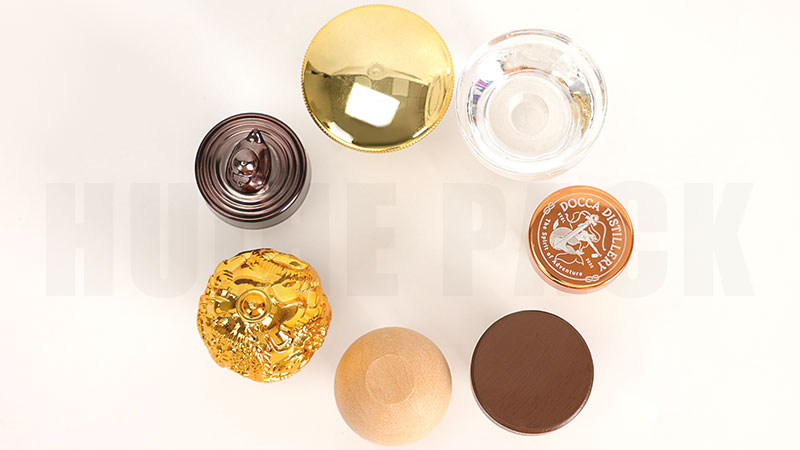
Conclusion – Choosing the Right Closure Seals More Than Just a Bottle
In the liquor corks vs screw cap debate, there is no single “winner.” Natural cork still gives the premium pop and micro-oxidation that aged whiskey loves; aluminum screw caps give an airtight, cost-friendly seal that export vodka needs. Match the closure to your spirit style, line speed, market price, and target law—then let the numbers, not nostalgia, drive the choice.
At HUIHE, we know that closures aren’t just about sealing bottles — they seal brand experiences. From natural corks and hybrid T-tops to custom screw caps and aluminum collars, we help distilleries worldwide design spirit bottle closures that look stunning, function flawlessly, and align with your sustainability goals.

FAQ: Liquor Corks vs Screw Caps
Q1. Are cork closures better than screw caps for liquor bottles?
Not necessarily. Corks are ideal for premium or aged spirits like whiskey, cognac, and brandy, adding a luxurious “pop” effect. Screw caps, on the other hand, offer airtight sealing and cost efficiency — great for vodka, rum, or export-oriented production lines.
Q2. Do screw caps affect liquor quality?
No. High-quality liquor bottle closures with aluminum or lined screw caps keep spirits stable by minimizing oxygen exposure. Unlike wine, most distilled liquors don’t require micro-oxygenation, so screw caps are perfectly safe.
Q3. What are the best closures for distilled spirits?
That depends on your positioning. For premium spirits, natural or synthetic T-top corks create a high-end feel. For standard or export products, aluminum screw caps or hybrid designs offer efficiency and recyclability.
Q4. Are synthetic corks a good alternative?
Yes. Synthetic corks are cost-effective, consistent in size, and perform well under automated capping. They’re also recyclable and unaffected by humidity — a smart choice for global distribution.
Q5. Which closure is best for 60 % ABV spirits?
Synthetic cork or aluminum screw cap. Both resist high-alcohol extraction and keep the seal tight above 30 °C storage.
Q6. How can I ensure my closure fits the bottle perfectly?
Always request technical drawings or physical samples before mass production. Even small variations in neck size or thread pitch can cause leaks or poor sealing. At HUIHE, we help you verify closure–bottle compatibility to avoid packaging headaches down the line.


